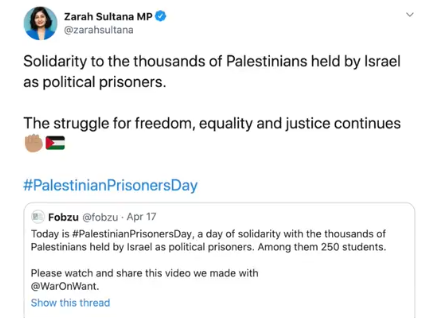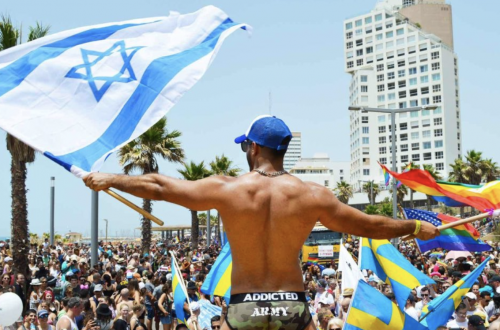Guest post by Hadar Sela
It’s not easy being a farmer anywhere in the world these days. Extreme weather conditions, bugs and blights make agriculture a financially risky business in a world in which food security is still an issue for some 13 percent of the population and yet service industries have overtaken agriculture as the main employer. The developed world’s demand for cheap food means that many farmers operate on low profit margins whilst agricultural trade policy reforms are still being debated in the decade-old Doha negotiations.
However, if you happen to be a farmer in one particular region of the world, there is an additional problem to be faced: the Boycott, Divestment and Sanctions movement. And contrary to what its advocates would have us believe, it harms Arab farmers in Israel and in the Gaza Strip just as much as it targets Jewish Israeli farmers.
In early June 2011 a group of BDS activists met in Montpellier, France, at an event named ‘The European Forum Against Agrexco’. According to their report:
Delegates from Italy, UK, Switzerland, Belgium, Netherlands, Spain, Germany and Palestine joined the French organizers for two full days of workshops aimed at strengthening the boycott campaign against the Israeli agricultural export giant.
Agrexco is Israel’s largest fresh produce exporter and European markets account for the vast majority of their sales under the brand Carmel. The Israeli government’s 50% stake in the company as well as their marketing of 60-70% of the fruit and vegetables grown in illegal Israeli settlements in the West Bank have made Agrexco a prime strategic target for the Boycott, Divestment and Sanctions (BDS) campaign.
However, the real picture is somewhat more complicated than that. Agrexco exports produce from all regions of Israel, grown by farmers from all ethnic backgrounds and religions. A boycott of Agrexco produce could only ever be a very blunt knife which would target Israeli farmers inside the ‘green line’ too – some of them Israeli Arabs – because, as one would expect in any liberal country, the produce is not labeled according to the religious persuasions or ethnic identification of its producer.
In 2007 the Israeli government set up a special body charged with the economic development of the Arab, Druze and Circassian minorities. One of its many aims is to expand and encourage joint business projects between Jews and Arabs. Agrexco can be seen as something of a role model for such initiatives. In addition, the Israeli Ministry of Agriculture and Rural Development set aside 20 percent (five million shekels) of its investment budget for 2011 exclusively for the development of agriculture within the Arab section of the population. In 2010 government grants to the Arab agricultural sector also amounted to 5 million shekels. In the area of financial subsidies to certain branches of agriculture, the Ministry of Agriculture employs criteria of ‘positive discrimination’ towards farmers belonging to the minorities.
The amount of agricultural land belonging to the Arab sector in Israel stands at 700,000 dunams. Of this, 500,000 dunams are currently under cultivation and they comprise 13 percent of the total farmland in the country. The Ministry of Agriculture also awards grants according to geographical area (rather than ethnic identity) to encourage the production of produce destined for export. In the ‘triangle’ region of the eastern Sharon plain, 2,000 dunams of cucumbers and 1,500 dunams of strawberries are grown and in the spring of 2011, fifteen thousand tons of cucumbers were exported from this region alone.
Calls by the BDS movement to boycott Agrexco produce would therefore cause damage to the livelihoods of Israeli Arab farmers, but they would also have a detrimental effect upon many farmers in Gaza.
Cooperation between Agrexco and Palestinian farmers in Gaza has a history of over thirty years. During the 1980s citrus growers in Gaza found– like their Israeli counterparts– that the crop was becoming less profitable. Agrexco, as a body which identifies market trends and developments, suggested to both Israeli and Palestinian farmers that greenhouses for the production of flowers and strawberries would be a suitable replacement for citrus groves and it was at that point that the cooperation was born.
Agrexco provided education and instruction on the new crops to the Palestinian farmers, teaching them innovative growing methods and providing professional support. The flower and fruit growers received instruction on how to produce a product which meets the high European standards, which included professional tours to Europe. Agrexco also helped the farmers to finance packing plants and cooling systems for storage units.
The two projects became a huge success with around 80 million flowers and 2,500 tons of strawberries being exported from the Gaza Strip. Many Palestinian growers formalized their operations with Agrexco in exactly the same manner as Israeli producers; with full business transparency regarding payment and service matters. In 1998 the Palestinian Authority tried to establish its own export operation for agricultural produce, but the Palestinian farmers refused to let go of Agrexco’s support and services.
In 2002 Agrexco and the leaders of the Gaza farmers’ association upgraded operations and created the new luxury brand ‘Coral‘ with the aim of promoting Palestinian produce and helping consumers to identify it. Agrexco’s professional instruction and advisory system was broadened and, in co-operation with the Israeli Ministry of Agriculture, professional literature was translated into Arabic.
The Hamas coup in Gaza in 2007 severely affected the operations of Palestinian farmers and their ability to keep in contact and cooperation with Agrexco. Gaza’s capacity to provide early winter strawberries and flowers for the European market makes a relatively short export season crucial to its economy. In 2005 agricultural exports from Gaza amounted to 41 million Euros, in 2007 – which saw the Hamas coup – they plummeted to less than half that figure and in 2008 were negligible. In 2009 partial success was seen as flower exports were fully operational, but exports of strawberries suffered due to delays in the openings of border crossings with Israel as a result of the deteriorating security situation. The 2010/11 season saw further improvement as the security situation improved after Operation Cast Lead.
Not only is the export of agricultural produce a significant factor in improving Gaza’s overall economy and the lives of the people there, but it also symbolizes the type of cooperation which is crucial to a peaceful future for the Middle East. Israel’s advanced technological know-how and innovative agricultural methods – particularly in the field of water conservation – are renowned among farmers worldwide and co-operation with Palestinian farmers helps them take advantage of this knowledge. The long-established export company Agrexco, with all its relevant transport network, infrastructure both at home and abroad, and its wealth of experience regarding meeting European standards, can and does act as an instantly available gateway for Palestinian produce to reach Europe, and one with all the added advantages of economies of scale. Israeli-Palestinian agricultural co-operation is currently the best way for the Palestinian farmers to maximize their potential and receive the best possible prices for their produce.
The government of the Netherlands apparently also recognizes just how important agriculture is to the Palestinian economy; so much so that in 2010 it donated six million Euros to two projects designed to “address food security concerns, high unemployment rates as well as to maintain and develop the full economic potential of the Gaza agricultural sector”. However, the Dutch government’s partner in these projects – an NGO known as the Palestinian Agricultural Development Association (PARC) – turns out to be active in the BDS campaign. In January 2011 it issued a press release which included the following statements:
The last attempt by Agrexco to export to Europe limited quantities of strawberries and flowers from the Gaza Strip, exploiting the illegal Israeli siege of Gaza and the inability of Palestinian farmers there to export except through Agrexco, was aimed at beautifying the image of the Israeli occupation and covering up all its ugly crimes against the Palestinian people, and especially through the ongoing Israeli siege of the steadfasting Gaza Strip.
On this occasion, PARC salutes all activists and international supporters for the BDS campaign and especially our French friends and partners who were able to frustrate the Agrexco attempt to conduct a joint press conference with a few exploited Palestinian producers.
PARC and the rest of the BDS campaign’s members are more than willing to sacrifice the livelihoods of both the Palestinian strawberry farmers in the Gaza Strip who choose to work with Agrexco and the Israeli Arab cucumber growers of Taybe or Jaljulia in their attempts to harm the Israeli company. That fact will come as no surprise to anyone who knows what really lies behind the BDS campaign: the rich rhetoric of human rights and justice is no more than a façade for a political campaign to dismantle Israel through the creation of a ‘one state solution’ enabled by the ‘right of return’ of millions of Palestinian refugees.
If that point is in need of clarification, it is worth taking note of the statement made by one of the organizers of the Montpellier meeting against Agrexco. Rafeef Ziadah, representative of the Palestinian BDS National Committee (BNC) which organized the event, is a Canadian of third generation Palestinian descent.
Rafeef concluded the forum with an open invitation to all to her house in Haifa, once Palestine is free. Once she can return home.
And the campaign to boycott the products of Carmel Agrexco is a step along the way.
Agrexco’s work has been the epitome of co-existence and co-operation for decades. It is precisely the kind of project which those who care equally for all the peoples of the region and aspire to see a Middle East in which Jews and Arabs work together for prosperity and peace should support. Significantly, the BDS movement doesn’t – it wishes to destroy it.


